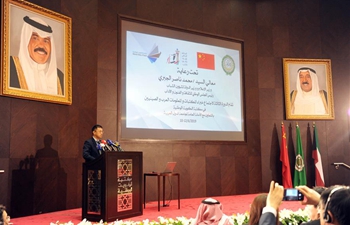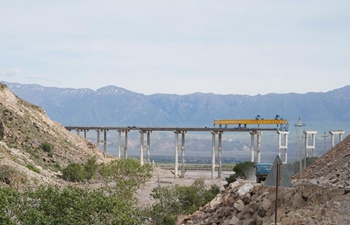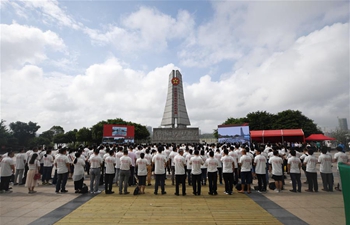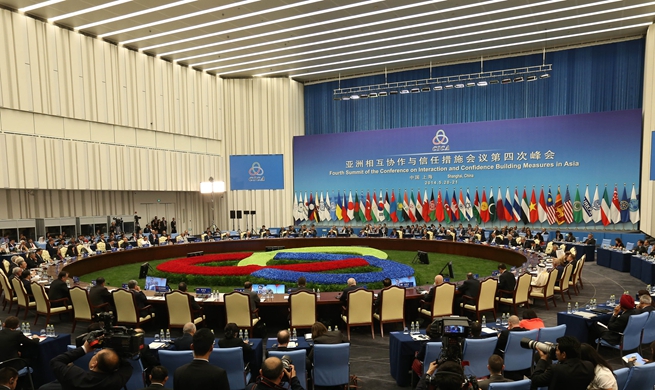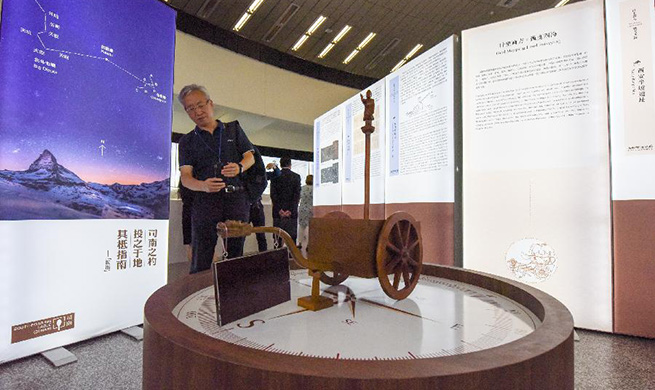by Olatunji Saliu & Yemi Fadare
ABUJA, June 11 (Xinhua) -- Following the inauguration of Nigeria's 9th federal parliament on Tuesday and the election of the new leadership of the Senate and House of Representatives, citizens of the West African country have called for a more cordial relationship between the executive and the legislative arms of government to engender prosperity.
The previous National Assembly had constant rifts with the Executive, a situation generally perceived to have stifled the country's growth in the past four years.
Senator Ahmed Lawan of Nigeria's governing All Progressives Congress (APC) party on Tuesday emerged as the country's new Senate president when the 9th National Assembly was inaugurated in the capital Abuja.
Also, Femi Gbajabiamila, representing the southwestern state of Lagos, was elected the Speaker of the House of Representatives.
Dozie Ifebi, an economist, opined that the discord among different political parties and also within the ruling All Progressives Congress (APC) party had fueled the animosity between the two arms of government, "which meant that the good of the country was sometimes affected by political wrangling."
Political analyst Majeed Bakare shared a similar view, noting, however, that though the federal parliament ought not to operate as a rubber stamp, the legislators should work "in tandem with the goals and aspirations of the Executive."
"The negative aspect of governance is the lack of sync between the executive and legislative arms of government. The fact that the ruling party had a majority in both the House of Representatives and Senate, they were unable to work in a cordial atmosphere. The executive is equally guilty," Bakare said.
To proffer solutions to the constant rifts, Henry Eni-Otu, a lawyer, advised the newly inaugurated lawmakers to synergize with the executive, proposing a committee made up of both parties to deliberate issues of national interest.
"If necessary, they (the legislature) should have a committee that will liaise with the executive at all times with respect to budgetary preparation and also the issue in respect to the time within which the budget is passed and how it should run," the legal luminary said.
RELEVANCE OF NIGERIAN NATIONAL ASSEMBLY
The Nigerian Senate and the House of Representatives make up the legislature, but they are fundamentally different in a few ways.
The Senate has 109 members representing the 36 states, with each Nigerian state having three senatorial districts. Only the capital Abuja has one Senator, but not without having the same power and representation in the Senate as every other state.
The House of Representatives has a total of 360 members, with each state divided into federal constituencies. All these constituencies add up to 360 seats.
They both exist to provide checks and balances within government, to protect the interests of the country and the citizens, and to ensure proper consideration and vetting of federal laws and functioning of the other arms of government.
No bill can become law unless a majority of the people, represented by the House of Representatives, and a majority of the senatorial districts, represented by the Senate, vote in favor of it becoming a federal law.
Either of the two can initiate a bill. If a bill is passed in the originating chamber, it then goes to the other chamber, where, if approved, it will become law. If not, it will not become law.
DISAPPOINTING RECORD OF PREVIOUS NATIONAL ASSEMBLY
Aside from the strained rapport, the previous National Assembly had a huge chunk of vetoed bills from President Muhammadu Buhari while holding a record of the highest number of bills ever passed since the inception of the legislature in the country.
During the valedictory session of the 8th National Assembly which held in Thursday, the former Speaker of the House of Representatives, Yakubu Dogara, revealed that out of 382 bills passed by the federal chambers, only 76 were signed into law.
Analysts believe the rejected bills, if passed, would have had an immense impact on Nigerians.
Bakare said that the assembly had practicable bills due to its collaborative efforts with the civil society groups.
"The 8th Assembly really tried for the fact that some of the bills and resolutions were timely. They were not just bills that originated from the National Assembly, they had input from civil society organizations, which means they truly came from the people," the political analyst told Xinhua.
One of such important yet vetoed bills is the Petroleum Industry Government Bill which sought to reform the oil sector so that its policies will be in tandem with international best practices; it was stalled for over a decade. Another is the amendment of the electoral laws which was rejected four times.
These bills were vetoed over drafting and financial issues, duplication of existing agencies, and inconsistency with prevailing laws, among others.
To prevent a recurrence, relevant stakeholders advised reviewing obsolete bills and laws and the passage of bills that correspond with current realities of the country.
"I believe that most of the existing laws are outdated and do not meet the test of the modern day. In legislative business, the legislators are expected to look through previous laws passed or existing laws to ensure that any new law which is coming into force does not go to either contradict or nullify the existing ones," Eni-Otu said.
For instance, the lawyer noted, there was the need for the 8th Assembly to review the Administration of Criminal Justice Act 2016 because Nigeria is now rated highly in terms of corruption.
Eni-Otu also advised gazetting and publications of laws, because they are unknown and equally not accessible to Nigerians.
President Buhari, while congratulating the newly elected principal officers of the 9th National Assembly, said he hoped it will be "new dawn, different from duplicity and perfidy of the immediate past."
"Stepping into the next level, the legislature has a big role to play for the goals of the administration to be achieved," Buhari said, noting "this is for the ultimate good of the nation."
According to him, the Executive does not desire a rubber stamp legislature. "While separation of powers is essential, collaboration among all arms of government should be the name of the game. Opposition need not be virulent," he added.
